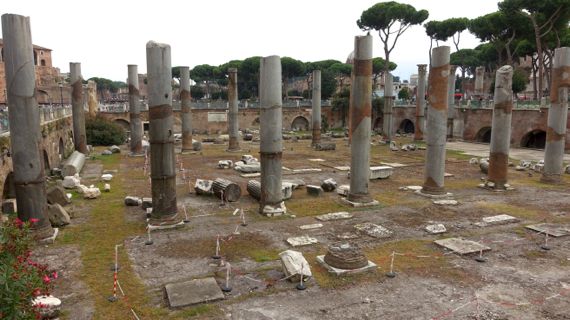Free ruin
Friday, 19 September 2014

The ruins of the Basilica Ulpia (north part) are framed by these two rows of columns. The footprint outlined by the columns continues to the right out of the photo and under the road.
The Basilica Ulpia was part of the Forum of Trajan, much of which is now covered by roads and buildings. Basilica at that time meant a large building with a public court function; Romans usually sited them adjacent to a town’s forum, the locus of commerce and governmental activity. Typically, basilicas had interior colonnades that allowed the building to be larger, and visually suggested a series of linear areas. This is the pattern adopted by early Christian temple-builders, and still used today. The earliest basilicas date to the 2nd C BC, although this one dates to the early 2nd C AD, or at least three centuries later.
Ulpia sounds pretty strange, and unconnected to Trajan unless you know that the Emperor Trajan’s (b. AD 53; d. AD 117) youthful name was Marcus Ulpius Traianus like his father, our word Trajan being a corruption. Ulpia is the gens (family with a common ancestor) that Trajan and his father identified with. Their ancestors were Roman colonists who settled in Iberia in the 3rd C BC.
The most striking surviving art from the Forum of Trajan is a triumphal column just to the far right outside this photo. It has a spiraling bas relief panel that portrays Trajan’s victory over the Dacians, who may have included my ancestors. Trajan’s Column is hollow, with an interior spiral stair, an engineering wonder that allowed access to the top, over 38 m above the ground surface. Despite earthquakes over the years and modern traffic and vibrations, the column remains almost exactly vertical.
The inscription on the square base is famous for what it says and for its letter forms. It says that the monument is in recognition of Trajan’s long service. The letters of the inscription are viewed as fine examples of Roman square capitals, and several modern typeface designers have used them for inspiration, including Carol Twombly, who designed the oft-used Trajan typeface for Adobe.
Displayed next to the column is an “unrolled” photograph of the bas relief, along with some commentary.
And all this eye candy is free!